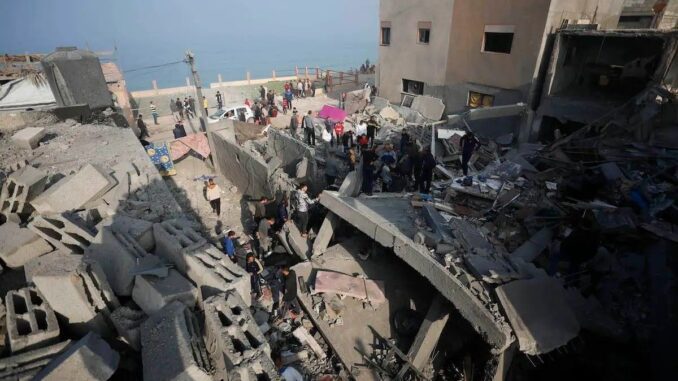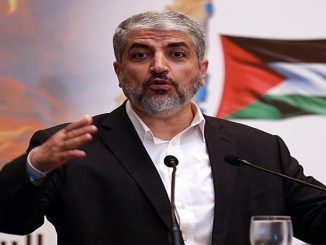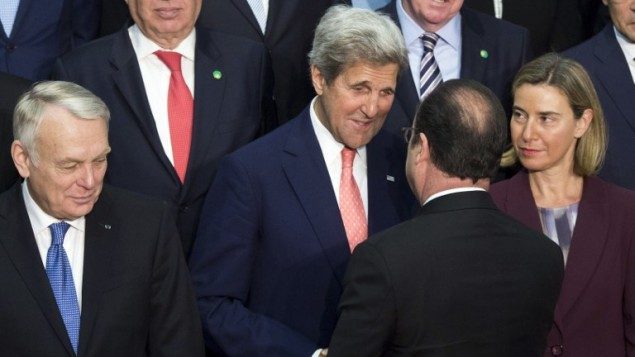
A salient report highlights how the Biden administration is planning for a postwar Gaza Strip.
Israeli Prime Minister Benjamin Netanyahu may not like the ideas, but he also may not get a say, states Nahal Toosi, Politico’s senior foreign affairs correspondent, who wrote the report, continuing:
The Biden administration officials have spent weeks quietly drafting a multiphase postwar game plan that envisions a revamped Palestinian Authority ultimately taking over the Gaza Strip.
It’s an imperfect solution, but American officials view it as the best of only bad options for a territory where a war between Israel and Hamas militants has shattered infrastructure, killed thousands of Palestinians and displaced more than 1.5 million others. It also could put the U.S. on a collision course with the Israeli government.
Officials at the State Department, the White House and beyond have been laying out pieces of the strategy in multiple position papers and interagency meetings since mid-October, according to two U.S. officials, a State Department official and an administration official familiar with the discussions.
Although Secretary of State Antony Blinken and others in the administration have publicly declared that a “revitalized” Palestinian Authority should run the strip, they haven’t unveiled details of how that would work.
But they’ve already run into resistance from Israeli Prime Minister Benjamin Netanyahu, who has effectively ruled out a future Gaza role for the Palestinian Authority. Israeli officials for the most part are unwilling to discuss much beyond the current war, which was sparked by the Oct. 7 Hamas attack on settlements in the vicinity of Gaza.
Still, the U.S. strategists drawing up the plans keep coming back to the Palestinian Authority, which governs parts of the West Bank but has long been beset by allegations of corruption and inefficiency. It’s the most viable option, they say.
“We’re stuck,” the State Department official said. “There’s a strong policy preference for the PA to play a governing role in Gaza, but it has significant legitimacy and capability challenges.”
The broad vision emerging from the internal talks is that of a multiphase reconstruction of Gaza once the heavy fighting between Israeli troops and Hamas militants ends. An international force will be needed to stabilize the region in the immediate aftermath, followed by a revamped Palestinian Authority taking over long-term.
Key parts of the plan include increasing security-related aid that the State Department’s Bureau of International Narcotics and Law Enforcement Affairs offers the Palestinian Authority and allowing for a bigger role for the U.S. Security Coordinator, which has a track record of advising Palestinian security forces, the officials said.
“Ultimately, we want to have a Palestinian security structure in post-conflict Gaza,” a senior Biden administration official said.
All of the officials were granted anonymity to discuss a highly sensitive topic. They stressed that the ideas being floated are nascent and subject to many unpredictable variables. U.S. officials expect the heavy fighting to last several more weeks, at least.
A spokesperson for the White House National Security Council declined to comment.
Any strategy set forth by the United States will face numerous obstacles, including Israeli skepticism and Arab frustration, even though regional players and analysts generally agree that Washington will need to play a critical role in the postwar phase.
“How you get there and what actually exists in Gaza to do that is really, really hard, as there isn’t a clean or easy answer,” one of the U.S. officials said.
The planning process is spearheaded by senior National Security Council official Brett McGurk. He is being assisted by Terry Wolff, a veteran of the Defense and State departments now at the NSC.
Other key figures involved include Barbara Leaf, Dan Shapiro and Hady Amr, who hold key Middle East roles at the State Department. The State Department units that deal with the Middle East and policy planning are involved, but other parts of the government are weighing in as needed.
Perhaps the trickiest immediate challenge is figuring out who will play a role in stabilizing Gaza in an interim post-fighting phase.
While Arab countries have appeared hesitant or outright unwilling to provide troops for Gaza, in more recent conversations some have seemed more open to the idea, the second U.S. official said. The Biden administration has ruled out sending U.S. troops. One idea that’s been bandied about is asking the United Arab Emirates to help rebuild health facilities or train civil servants.
The United Nations could play a role in Gaza in a postwar phase, at the very least on the humanitarian front, the second U.S. official said. However, the Israeli government is not a fan of the U.N., viewing it as biased against Israelis.
Neighboring Egypt is likely to play a major role in a postwar Gaza. Egyptian President Abdel Fattah El-Sisi’s suggestion that a future Palestinian state be demilitarized with a temporary international security presence has made the rounds in Biden administration circles.
“The big unknown is what exactly is going to be left of Hamas in Gaza,” the senior Biden administration official said. Even if the group’s numbers are low, their access to weapons could dramatically alter the calculus of countries considering sending troops.
One thing the United States hopes to see is more clear denunciations of Hamas by Arab rulers, many of whom privately despise the Islamist militant group, which they see as a potential threat to their own governments. Hamas wrested control of Gaza away from the Palestinian Authority more than 15 years ago.
The key to getting many Arab leaders on board for serious postwar planning appears to be that the creation of a Palestinian state alongside Israel is the ultimate end goal.
The State Department official said American officials are largely motivated by that same outcome, but planning at the moment centers on stabilizing Gaza. One reason President Joe Biden and his aides have refused to call for a long-term cease-fire is that they support the Israeli objective of destroying Hamas, which Washington views as a major obstacle to a two-state solution.
The current Palestinian Authority is disliked by many Palestinians, who view it as corrupt, out of touch and weak. It has not held an election in years and is run by 88-year-old Mahmoud Abbas, who has yet to clearly denounce the Hamas attack.
A spokesperson for the Palestinian Authority could not be reached for comment. Abbas is reported to have previously said that the Palestinian Authority won’t take over Gaza on the back of Israeli tanks, meaning it does not want to be seen as a puppet.
Although U.S. officials — including Biden himself — use the word “revitalized” to describe their hopes for a future Palestinian Authority running Gaza, words like “reformed,” “revamped” or “restructured” are probably more applicable.
In response to a request for comment from the Israeli government, an Israeli official, granted anonymity to discuss an issue still under review, said “the gap between the United States and Israel is much smaller than what meets the eye.”
“Both administrations agree that the PA in its current form cannot govern Gaza,” the official said. “A revitalized, reformed one might be able to do it. But we’re still not in discussions about what exactly this reform should look like.”
Still, it’s not clear what — if any — level of change to the Palestinian Authority would satisfy Netanyahu or his political allies.
Netanyahu has at times called for a new Palestinian governance structure in Gaza while also suggesting Israel should have some sort of general security control. His comments have not always been consistent, but they do not suggest an openness to future Palestinian Authority rule in Gaza.
The Israeli leader has long been accused of intentionally trying to undermine the Palestinian Authority as a way to avoid the creation of a Palestinian state. Netanyahu insists the Palestinian Authority is not a serious partner in the quest for a two-state solution and that it promotes hatred against Jews.
That said, it’s also unclear how much longer Netanyahu and his right-wing coalition will be in charge of Israel. Netanyahu is deeply unpopular, with many Israelis blaming him for the Oct. 7 Hamas attack. U.S. officials expect his eventual departure from the scene, but he’s managed political comebacks before.
U.S. officials haven’t had as much luck as they’d like in getting Israeli leaders to discuss in a meaningful way what a postwar Gaza will look like, the administration official said. And some analysts and officials in Washington worry that even trying to define what counts as the end of the war will over time become a point of contention between Israel and the United States. It’s not as if someone will blow a whistle and everyone lays down arms.
“The Israelis are in no mood to talk about the day after,” the administration official said. “They’re very much focused on today, the day of, so there hasn’t been a whole lot of traction there.”
Despite this, there’s virtually no internal Biden administration talk of conditioning U.S. military aid to Israel as a way to pressure the country to agree to some of the ideas under discussion in Washington, the State Department official said.
In an interview that aired this weekend on ABC News, Ron Dermer, a top Netanyahu aide, downplayed the idea of a Palestinian state, although he said an eventual political settlement could be reached with the Palestinians.
“I know that everybody is racing forward right now to try to establish a Palestinian state. For the people of Israel, they don’t even understand that because we just suffered the equivalent of 20 9/11s,” he said. “And I think the last thing you want to do is send a message to any terror group that the way you’re going to achieve some sort of aim is to perpetrate a massive terror attack.”
As it plans ahead, the Biden administration is consulting outside analysts, civil society activists and others, some of whom warned of potential pitfalls.
For one thing, Arab countries in the region cannot even agree among themselves how to approach a postwar scenario, and those are the countries the U.S. hopes will fund any reconstruction.
There’s also the U.S. presidential election in 2024. If a Republican wins, they are likely to defer even more to Israel’s wishes, even if that angers America’s Arab partners in the Middle East.
American officials mapping out the various scenarios are struggling because of the many variables involved. Unlike Russia’s full-scale invasion of Ukraine, which the Biden administration saw coming months in advance, the Hamas attack was a surprise to the U.S. establishment.
Nearly two months in, “people are fried,” the administration official said.
The senior administration official sounded a more optimistic note: “We have identified every possible contingency,” the official said. “As things unfold, our hope is to be able to seize the moment.”
Brian Katulis, an analyst with the Middle East Institute, a Washington think tank, urged U.S. officials to try to help better organize Arab countries so that they can have a clearer voice in the direction of the conflict.
He sympathized with the frustrations of U.S. officials trying to solve the latest puzzle in the decadeslong Israeli-Palestinian conflict.
“It’s sort of like the Choose Your Own Adventure book that you don’t control, because the circumstances will define what the possibilities are,” he said.



